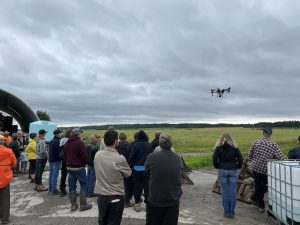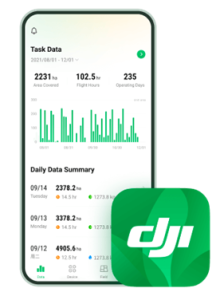Written by Haylee Archambault, NOFIA summer student, on behalf of the Northeastern Regional Communications Coordinator

Members of the West Nipissing/East Sudbury SCIA watched as Wonderfull Inc. demoed the drone technology.
This summer, Wonderfull Inc., a DJI agriculture drone company, attended the Temiskaming Crops Coalition and West Nipissing-East Sudbury Soil & Crop Improvement Association crop tours. Jenny and Alex Chen, owners of Wonderfull Inc., demoed their cutting-edge technology in cropping systems: a six-propeller T-20 drone distributed by DJI Agriculture.
While many tour participants where amazed with Alex’s technical capabilities and exemplary application of the drone, Jenny’s discussion regarding the technological advantages of drone technologies applicable to agriculture captivated both Temiskaming and West Nipissing-East Sudbury growers. The drone that was demoed could be used for seeding a cover crop or spraying chemicals, helping to reduce trips over the field causing compaction. That’s just one of the benefits. Below is a summary of Jenny’s discussion with Northeastern producers:
- Drones apply chemical sprays at higher concentrations, therefore they only utilize 10% of the water needed by traditional sprayers.
- The drone can spray at a rate of 25-30 acres per hour.
- Spray pattern width can be altered from 3 to 9 metres to cover irregular-shaped fields and limit overlap waste.
- Batteries last for 15-18 minutes of flying time and require 10-12 minutes to recharge – this drone comes with 4 batteries.
- The drone has enhanced mapping capabilities compared to a GPS system. For example, a field that takes 4-5 hours to map conventionally can be mapped with drone technology in 10 minutes.
- Unlike traditional cropping methods, the use of drones is not hindered by wet field conditions, night fall or wind.
- Drones are equipped with an easy-to-use, producer-friendly software, the DJI SmartFarm App.
- Cost savings associated with use of a drone includes 30-50% on chemicals, 60-70% fuel consumption, 10% waste. Overall, it is estimated that chemical application with a drone can save growers up to $6,000.00 per 100 acres.
So what does this technology cost? To answer the million-dollar question asked by producers on the tours, the T-20 drone is listed for $42,800.00. Jenny reminds growers to take into consideration the cost of conventional equipment when contemplating the price of the T-20 drone.
Although the thought of using a drone for cropping may seem effortless and efficient compared to the traditional farming equipment, do you feel as though learning how to fly a drone might go right over your head? No need to worry! There is an Agricultural Drone Operation course developed by DJI Academy that provides classes and flight sessions for trainees. This course includes an overview on flight operation, mission workflows, flight safety knowledge, and basic maintenance operations. Through online videos, those who are interested can become an Unmanned Aircraft Systems (UAS) licensed pilot. Overall, the course allows trainees to become certified more quickly to meet the market demand for more agricultural drone pilots.
To register for the course, visit: https://www.uastc.com/us/utc_DAC/show/126.html
Is becoming a certified agriculture drone pilot not ‘written in the stars’ for you? Wonderfull Inc. and other establishments offer mapping and flying services to producers.
DJI Agriculture continues to improve their technology and efficiency to enhance the application and flight of their drones. Visit their website at www.wonderfull.ca to stay up to date on the latest drone updates and reveals.
